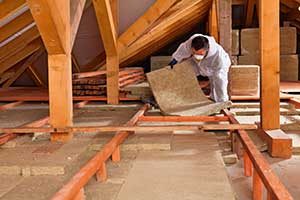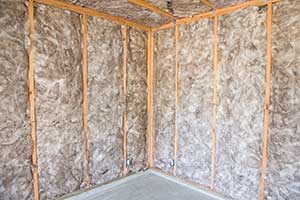 Your home’s insulation is multi-talented. In the summer, insulation protects your cooled air from escaping and keeps the heat at bay. In the winter, insulation retains your warmed air and prevents the cold from permeating. Insulation helps your heating and cooling systems stay efficient. Insulation prevents the transfer of noise. Insulation prevents the infiltration of water, thereby preventing the growth of molds and bacteria, protecting your family from respiratory illnesses. Insulation dramatically decreases your energy costs–so much so that the EPA declared properly installed insulation as one of the most cost-saving projects for the American homeowner.
Your home’s insulation is multi-talented. In the summer, insulation protects your cooled air from escaping and keeps the heat at bay. In the winter, insulation retains your warmed air and prevents the cold from permeating. Insulation helps your heating and cooling systems stay efficient. Insulation prevents the transfer of noise. Insulation prevents the infiltration of water, thereby preventing the growth of molds and bacteria, protecting your family from respiratory illnesses. Insulation dramatically decreases your energy costs–so much so that the EPA declared properly installed insulation as one of the most cost-saving projects for the American homeowner.
Properly installed insulation will greatly benefit your home and the comfort of your family. You want to ensure the right kind of insulation is being installed in the right places, as well as the right amount. Don’t leave your home unprotected: make sure you have insulation installed in the areas you need it most.
Where to Insulate Your Home
Attic Insulation
The attic is one of the most vital areas of your house that needs insulation. Insulating your attic can prevent the gain of unwanted hot or cold air, as well as the loss of wanted hot or cold air. By protecting and maintaining your home’s particular climate, attic insulation will also make your heating/cooling system more efficient, dramatically reducing your energy costs. Having an insulated attic can also prevent roof leakage from permeating into your walls and rafters, growing mold and spreading bacteria throughout your home. Attic insulation is even healthy for your roof, preventing a constant cycle of freezing and thawing that can damage the integrity of your roof.
Exterior Wall Insulation
Insulating your exterior walls will dramatically improve your home’s climate, and drastically decrease your energy expenses. Exterior wall insulation prevents drafts and the loss of your heated/cooled air. Exterior wall insulation even protects your home from thermal bridging which causes unnecessary heat gain to your home. By protecting your controlled climate, exterior wall insulation also improves the efficiency of your heating/cooling system. Much like attic insulation, exterior wall insulation also prevents the internal growth of condensation, which can cause molds and bacteria growth. Exterior wall insulation will even keep your home quiet: keeping out the noise of the neighborhood, street, or traffic.
Interior Wall Insulation
 Interior wall insulation is often overlooked because there is a common misconception that only the exterior walls need to be insulated because they come in direct contact with the outside elements. Insulating your interior walls can decrease your energy costs and increase your heating/cooling efficiency just as dramatically as external wall insulation. Interior wall insulation further prevents the transfer of unwanted cold or heat. Interior wall insulation also isolates noise to individual rooms: meaning, if you’re sleeping in your bedroom, you won’t be disturbed by the music blaring in the room next to yours. Interior wall insulation provides that extra protection, furthering improving the comfort of your home.
Interior wall insulation is often overlooked because there is a common misconception that only the exterior walls need to be insulated because they come in direct contact with the outside elements. Insulating your interior walls can decrease your energy costs and increase your heating/cooling efficiency just as dramatically as external wall insulation. Interior wall insulation further prevents the transfer of unwanted cold or heat. Interior wall insulation also isolates noise to individual rooms: meaning, if you’re sleeping in your bedroom, you won’t be disturbed by the music blaring in the room next to yours. Interior wall insulation provides that extra protection, furthering improving the comfort of your home.
Basement Insulation
Just like attic insulation and exterior wall insulation, basement insulation prevents the infiltration of unwanted temperatures and the maintenance of wanted temperatures. Basements are particularly prone to losing heat, making heating your home difficult. For instance, during the winter, if you’re trying to keep your groundfloor warm, your heating system has to fight the loss of heat as it rises, as well as the penetration of cold through both the external walls and the basement. This loss of heat is especially apparent with basements because so many other rooms are connected to the basement space. An insulated basement will decrease your heating costs, and improve the even distribution of desired temperatures.
Garage Insulation
An attached garage, much like the basement, is another area of the home that does not easily retain a consistent, desired temperature. Usually, garages are not heated or cooled by the home’s heating/cooling system; instead, they are heated and cooled by the imposing external temperatures. A bare garage will transfer the cold of winter, or the heat of summer, into any room that is connected to the garage, including any living space located above the garage. Insulating your garage fully protects your home’s precise internal climate.
Air Duct Insulation
Air duct insulation not only quiets the noise of your heating/cooling system, but also protects the growth of bacteria and the infiltration of water. When your air ducts are sealed and properly insulated, the efficiency of the air duct is increased, allowing a more full, and thorough, distribution of air throughout your home.
When to Insulate Your Home
Today! Regardless of the layout of your home, the age of your home, and existing insulation, your home can only benefit from improved and added insulation. Don’t wait for your air conditioning to struggle against the heat of summer, or for your home to freeze over in the middle of winter: insulate your home now!
How to Know Your Insulation Needs
Hiring a professional contractor, or engaging in a home energy audit, can help you determine which rooms of your home should be insulated, and what it should be insulated with. A home energy audit assesses the airflow of your home, identifying leaks, cracks, openings, and your home’s overall resistance to cool air and hot air, as well as how that cold and heat is distributed throughout the house. Working with a professional contractor ensures that you make the most educated insulation decisions, as their years of experience and expertise will allow them to guide you through all of your insulation options.